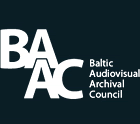Estonian working group met in Tallinn on October 24, 2006
The BAAC Estonian working group had its 5th meeting at Estonian Filmarchives in Tallinn on October 24, 2006. Participants were BAAC members Ivi Tomingas (Estonian Filmarchives), Reet Harkmaa (Estonian Television), Eha Väinsalu (ETV), Sulev Sepp (Scanpix Baltics), Piret Noorhani (Estonian Literary Museum) and non-members Peeter Ossip (Fotomill), Maiu Kurvits (Kumu Art Museum), Lea Tegelmann (Filmarchives).
Piret Noorhani thanked everybody for participating in the Riga Seminar 2006 “Audiovisual Archives: Access and Service in the Public Interest” and made some conclusions. 79 participants from 9 countries attended: 32 from Latvia, 20 from Estonia, 9 both from Norway and Sweden, 4 from Lithuania, 2 from Canada and 1 from Finland, England and U.S.A. Estonian working group was pleased with the number of Estonian participants and their contribution to the Seminar, but we know, that there are more institutions in Estonia who could gain from joining BAAC activities and conferences in the future. This is a task for every single member of the working group to disseminate information about BAAC among colleagues.
The organization of the Riga Seminar and programme were analyzed. Taking into consideration the variety of interests of all participants coming from different institutions and representing different fields was mentioned as a problem. At the same time it was also considered an advantage: diversity of the programme gives everybody a possibility to put their activities into wider context, to make broader – and sometimes even unexpected! - professional contacts etc. It was still suggested that in the future more attention should be paid to the analytical aspect of the presentations and practical outcome of the workshops.
Piret Noorhani gave a short account on the planning activities of IASA-BAAC Conference 2007 and presented the first call for papers, which was elaborated by the Programming Committee. The main theme and sub-themes of the conference were discussed and approved. The ways and possibilities to find potential newcomers to IASA-BAAC Conference and new members to BAAC from Estonia were also discussed.
Regional activities between the BAAC annual conferences should guarantee the necessary continuity and justification to BAAC as an organization. Everybody was supporting the idea of the BAAC Board to have special task-forces for organizing mini-seminars, workshops and professional visits, which could bring together people working with AV archives around the year. Colleagues from other institutions agreed that in the near future the priority in the activities should be given to TV archives. The Estonian working group was very positive about the leadership of Tedd Urnes and his co-operation with Baltic TV archives. Let`s hope that workshops and meetings will be held soon to gain not only the attention of archivists but also - and especially! - of the managements of Baltic TV companies. We should get working contacts also with private TV companies.
Some other possible themes for the workshops were discussed. Digitization of the archives and legal matters are universal topics and necessary to everyone working with AV archives.
The action plan of the BAAC Estonian working group was the last topic of the day. Since autumn 2005 we have had 5 meetings. Professional visits to Estonian Filmarchives, ETV and Scanpix Baltics office in Tallinn has been organized. We decided to keep up with the tradition, but we will try to go even further and have discussions and presentations on narrower topics. The next attempt will be made at Kumu Art Museum in Tallinn in December 2006. The coordinator for the event, Maiu Kurvits promised to show us the restoration department of the Museum in their brand new building. In February, a meeting with the representatives of the Council of the Digital Preservation of Estonian Cultural Heritage will be initiated, where we hope to hear about the recent activities of the Council and discuss possibilities for cooperation with BAAC (coordinator Ivi Tomingas).
Although without photographic evidence (unfortunately, none of the AV archivists had a camera with them), we are confirming that all participants of the meeting were happy to meet each other again and ready to move forward. We suggest it also to our Latvian and Lithuanian colleagues: make the most of the contacts you have made at Riga Seminars – both on a national and international level. Use the advantages of being a part of the archival community!
Piret Noorhani
Estonian Literary Museum, Tartu
